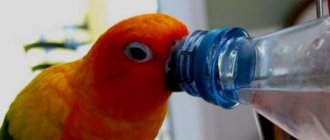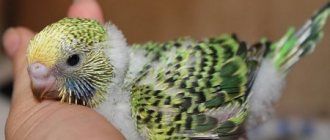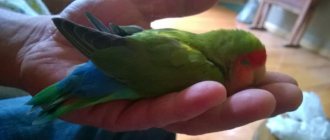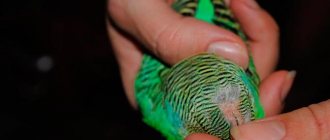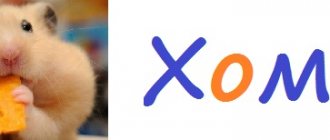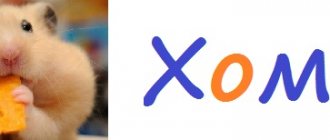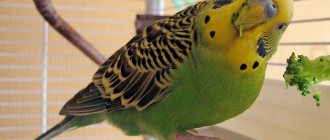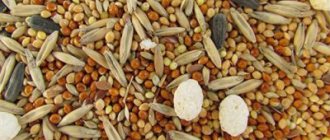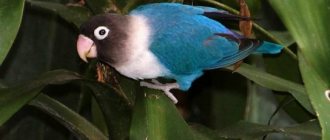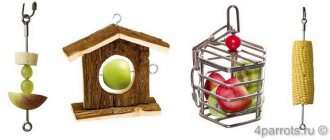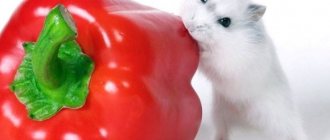Most owners of feathered pets offer their pets grain food as the main diet. However, this is not enough to provide the body with the necessary amount of nutrients. In nature, dry grain feed is not the basis of the bird’s diet. According to ornithologists, fruits for parrots are a mandatory component in the daily menu.
Here you will find the answer to the question: what fruits can budgies, cockatiels, lovebirds, grays, cockatoos, and Amazons eat? And also the answer to the second equally important question, which many often forget about - which ones are not allowed.
What can a bird do?
Birds will be happy with both dried and fresh fruits. Treats help you better build a strong relationship with your pet and make him sweet and obedient.
Birds will rarely agree to cut up a delicacy on their own, so it is better to prepare each fruit in advance for the bird to eat: grate, cut, turn into pulp. The parrot himself will tell you which preparation is best to make.
If we add to this a huge supply of all spectrums of vitamins in fruits, then we get a healthy, nutritious and pleasant product that improves the mood of both the bird and the owner.
Here is a list of healthy fruits that wavy eaters eat:
apples are a mild mixture of vitamins that will help your parrot better digest the main dish. Contains beneficial plant fibers and organic acids;- orange – contains difficult-to-digest fiber, essential essential oils and carbohydrates. This mixture of substances provides lasting protection against viruses and infections;
- Bananas are a storehouse of calcium, magnesium and potassium. It is highly nutritious, so it is perfect for a quick snack;
- grapes – contains the entire spectrum of microelements and B vitamins. Suitable as a delicacy for heavy food, because helps cleanse the body and remove all accumulated toxins;
- pomegranate – ensures stable functioning of the cardiovascular system of birds;
- apricot - large amounts of sugar, insulin and starch will make the budgie a little happier, and provitamin A, iron and acids strengthen the immune system and reduce the risks of cardiovascular diseases;
- kiwi – ranks first in terms of vitamin C content in fruits. It will make the parrot's feathers soft, pleasant and beautiful, and also protect against viruses;
- pineapple – works on muscles and blood vessels. Strengthens the health of the bird and helps to digest and assimilate food rich in protein;
- pears - ornithologists strongly recommend adding a piece of pear to every diet, because it contains a large amount of pectin, which effectively stimulates digestion. In addition, pears contain carbohydrates, iron and phosphorus.
- watermelon and melon - small amounts are allowed, but only those that you have already tried yourself.
All fruits must be thoroughly washed and peeled so that the budgie does not accidentally choke on the skin. It is also necessary to monitor the presence of seeds, because they contain hydrocyanic acid, which is dangerous for the stomach of birds.
It is also useful to read: How many times a day should you feed a budgie?
Forbidden and healthy fruits
There are many natural fruits suitable for birds living at home. Figuring out which fruits can be included in a parrot’s diet is not easy.
Utility table
| Fruits | Benefit | In what quantities should I give? |
| Persimmon | Prohibited | — |
| Avocado | Prohibited | — |
| Papaya | Prohibited | — |
| Grape | You can give | No more than 3 berries |
| Banana | Allowed | No more than 2 times a week |
| Cranberry | Can | 5–10 berries per day |
| Strawberry | Allowed | No more than 2 berries per day |
| Watermelon | Can | No more than 20 g per day |
| Melon | Allowed | 20–30 g per day |
It is important for every owner to understand the benefits and harms of fruits needed by budgies. Food common in the natural habitat does not always benefit residents of tropical latitudes in captivity.
What's prohibited
The curiosity of budgerigars sometimes backfires on their owners, so you need to keep an eye on what the pet pecks.
Ornithologists categorically prohibit feeding parrots from the common table, because... Human food is very poorly tolerated by birds and can cause irreparable damage.
Do you give your parrot fruit?
Yes No
The following are contraindicated for a feathered pet:
- papaya;
- mango;
- pomelo;
- persimmon;
- avocado.
These fruits are picked while still unripe, and they reach their ripeness only in the carrier’s car. In addition, their juice is rich in glycosides, papin and various alkaloids, which are poison for parrots.
Birds are not against dried fruits, but they can only be given after preliminary soaking . At the same time, all types of candied delicacies are contraindicated, but you can offer the bird dried fruits (raisins, prunes, dried apricots) pre-steamed with boiling water.
Green feed
It must be remembered that it is not enough to give birds only grain mixtures; their diet should be supplemented with other ingredients. For example, green food. Fresh greens contain many vitamins, so they are very healthy.
What do budgies like? Birds really like to eat young tree branches; they happily eat buds, bark, and wood. In addition, parrots willingly eat leaves of vegetable plants, the so-called “tops” - young leaves of carrots, radishes, and lettuce. In summer there is no shortage of leaves and herbs. To know what grass budgies eat, you need to carefully read and memorize the list below.
In the summer you can pick the following plants: dandelion, clover, chickweed, bluegrass, fireweed, shepherd's purse, wheatgrass, plantain, nasturtium, timothy, strawberry leaves. Plants should be plucked away from roads and busy highways, and pets should be avoided. It is best to collect plants outside the city limits.
But it should be remembered that not all plants are useful for parrots, and some are even dangerous. Fans of feathered pets should remember well what is prohibited for budgies.
Some indoor plants are very dangerous for these birds; parrots can become poisoned if they eat them. Among these plants are amaryllis, hyacinth, azalea, hydrangea, periwinkle, dieffenbachia, cocoa tree, caladium, jasmine, narcissus, cana, bracken fern, nightshade, colocasia, poinsettia, crocus, laurel, ranunculaceae, oleander, ivy, philodendron, aeonium and etc.
Poisonous flowers: tulip, narcissus, poppy, peony, etc. Poisonous wild plants: buckthorn, white acacia, oak, burdock, juniper, horse chestnut, elderberry, etc.
Twig food is perfect for vitamin feeding in winter. Tree branches also help clean the parrot's beak.
The following branches are excellent for branch food: - Birch, - Linden, - Currant, - Cherry, - Apple, - Raspberry.
Among the trees there are also poisonous for small pets: lilac, bird cherry, coniferous trees, pear.
How often can you include it in your diet?
The general rule for feeding fruits is to give them every day.
However, some of them require a special approach:
- apple and pears – you don’t have to limit their consumption, because they are quickly digested and absorbed by the bird, and consist exclusively of useful substances;
- bananas - to make the parrot beautiful and slender, you will have to limit it to a couple of pieces a day;
- grapes are a fairly acidic product and large quantities can increase the acidity of the stomach. If you limit it to 2-3 pieces per day, your pet will receive only useful substances. The berries need to be peeled, but let the grape seeds remain, because... they are easily digestible and beneficial for birds;
- pomegranate is an incredibly healthy product, but it is important to give it with extreme caution according to the plan. Start with one grain a day and then every day one more grain. This way the bird’s body will be able to adapt to the new product and get the most from it. A budgie can only digest 1/6 of a pomegranate per day;
- orange – like other citrus fruits, you should limit it to one small piece per day.
It is also useful to read: Review of food for budgies
Compliance with drinking regime
The parrot must always have clean water in its drinking bowl. In the winter season, they can drink less; in the summer, they can get some of their moisture from fruits, but regardless of the intensity of drinking, the water in the drinking bowl must be perfectly clean. The contents of the drinking bowls are replaced daily.
Boiled water, as well as tap water, is not suitable for birds. You should add purified bottled water or water that has passed through a home filter.
As a vitamin supplement, add lemon juice, rosehip or chamomile decoction to the water. They have a beneficial effect on the gastrointestinal microflora and saturate the body with vitamin C.
How to train a bird to eat fruit treats
The owner of a parrot must be prepared for the fact that the pet will not rush headlong into a tasty treat and therefore efforts must be made to accustom the pet to:
- You need to fully reveal the aroma and taste of the sweet treat. To do this, you can grind it. Already during the process, the parrot will become interested in the treat. If we are talking about juicy treats, then it is worth squeezing out all the tastiest things from them so that the parrot can fully enjoy the taste.
- It is important to eat the fruit itself slowly near your budgie. This will definitely arouse his interest and then you can share with him a small, pre-prepared piece. Budgerigars often repeat the behavior of their owners, so the bird's character often matches the character of the owner.
- There are special accessories and fruit holders that can be hung directly into the cage. In his home, a parrot can get acquainted with the curiosity in detail and begin to play. And already in the process, the bird is guaranteed to peck at the treat, and then it’s a matter of taste.
Budgerigars can be very picky, so you should try to give them different fruits to try, and then the feathered gourmet will choose the best dish for himself, which can be safely added to his diet.
Practical tips in the video:
Feeding and keeping budgies at home
In a house where there are birds, caring for, feeding and keeping parrots become habitual activities. Nutrition should be complete and varied. It consists:
- corn;
- vegetables;
- fruits;
- sepia;
- vitamin and mineral supplements;
- twigs.
Grain is poured every day. Fresh vegetables and fruits should be removed after 2 - 3 hours so that they do not spoil or rot. Sepia and twigs must be kept in the cage at all times.
In the wild, birds primarily feed on grass seeds. They walk on the ground, collecting grains, and climb trees and bushes to eat berries and fruits. Not realizing the damage they cause to farmers, they raid crops and harvest.
At home, the main grain for birds is millet. Small smooth grains are swallowed whole. You can buy ready-made mixtures in the store or make your own by mixing several types of seeds together:
- oats;
- flax seed;
- grass seeds;
- hemp seed;
- sunflower.
In addition to those listed, ready-made grain mixtures include sesame, nougat, and meadow grass seeds. When buying food, watch which parrot eats fully and with appetite. He should not select certain types of grains. Experiment by offering him different types of grain mixtures.
When purchasing, check the expiration date of the grain. It is advisable to open the pack on the spot and make sure that the mixture inside is clean and free of dirt and mold.
Fresh vegetables, peeled and washed after the water has drained, are cut into pieces and poured into the feeder:
- cucumbers;
- tomatoes;
- carrot;
- salad;
- beet;
- Bell pepper;
- spinach;
- cabbage;
- zucchini
Corn and legumes should be given soft, milky ripeness. Grate the carrots into pieces or mix with a boiled egg.
Tomatoes must be ripe, without solanine, which is found in green fruits. It is useful for the bird to peck tomato seeds.
Cabbage and beets contain fiber and healthy vitamins. It is necessary to accustom the bird to it gradually, adding in small portions. Otherwise, your pet may have stomach problems.
Only ripe watermelon is useful. It can be cut into small pieces and strung on a thread along with vegetables and fruits. By hanging them, you will force the parrot to do exercises.
Prohibited vegetables include:
- radish;
- radish;
- celery;
- garlic;
- onion;
- eggplant.
Do not give plants with strong odors, dill, parsley, basil.
Do not feed your bird onions and garlic because they have a strong odor.
It is advisable to peel fruits, especially store-bought ones. You should not give your budgie candied fruits, smoked and candied pieces of fruit, only fresh, cut into pieces and berries:
- plum;
- peach;
- apple;
- pear;
- banana;
- grape;
- cherry;
- raspberries.
Wild berries are given in winter, the dried ones are steamed:
- currant;
- strawberries;
- sea buckthorn;
- cowberry.
Pineapple is given in small quantities as a treat. Kiwi is pre-cleaned. Pomegranate seeds are rich in sugars and microelements, both pulp and seeds.
A parrot can crack nuts with its beak, but they should not be given to the bird. Exotic fruits that do not grow in Australia are also prohibited, especially persimmons, mangoes and avacados.
Right choice
The first thing a parrot owner should pay attention to when buying fruit is the season. Birds are very sensitive to pesticides and chemicals, so they will either not eat fruits grown in a greenhouse at all, or they will simply be poisoned.
On supermarket shelves, products are often treated with special products that give them shine and shine. Despite their attractive appearance, such fruits are not recommended to be given to birds. So it’s worth looking at the naturalness of the look and the consistency of its consistency.
Fruits should not raise any suspicion about their quality. Freshness, ripeness, absence of mold and rot are prerequisites for quality nutrition. It is worth looking at 6-7 fruits to understand the quality of the batch.
Berries for the parrot
Parrots can eat not only fruits - they love to feast on berries. Make sure you always have fresh, dried or frozen fruits in stock:
- Rowan;
- currant;
- irga;
- rose hip;
- honeysuckle;
- raspberries;
- gooseberry;
- chokeberry.
At the beginning of summer comes the season of fragrant strawberries. It contains vitamin C and antioxidants, so its benefits are undeniable. The answer to the question whether a parrot can eat strawberries is only positive if the amount of nitrates does not exceed the norm.
The gifts of the swamp are tasty and healthy: cranberries, lingonberries, blueberries, cloudberries. Birds often peck at the berries, getting to the seeds - their favorite food.
Attention! Small parrots may choke on round berries while trying to swallow them whole. The treat must be crushed to protect the pet from death.
Frozen berries retain all the vitamins, so this method of preparation is best suited. You should not pour berries into the feeder straight from the freezer; let them melt, otherwise the bird will catch a cold. You can make compote without sugar from dry berries. Fruit and berry seeds are not garbage, they are needed for training and strengthening the beak. Birds have fun by chewing shells with their beaks.
Methods for solving the problem
The most difficult thing is to teach wavy animals to eat fruits. If a budgie does not eat fruit for a long time, it is recommended to enrich its diet with vitamin complexes or a grain vitamin mixture. Larger bird species eagerly eat all fresh and dried fruits offered.
The demonstration method works well when the owner shows visually and emotionally that the food is very tasty. You can put a piece of pear on the cage or between the bars and pretend that it is very tasty. The owner's affectionate voice and demonstration of eating often encourages the bird to come up and try. Until the parrot learns to eat on its own, its diet should be enriched with vitamin complexes. Among these, a liquid composition added to the drinker has a good effect. Care and patience are all that is necessary for a bird to learn to eat fruits.
The parrot does not want to eat fruit: what is the reason
Our birds are big conservatives, so they prefer to eat only familiar foods. If you have acquired an adult and she refuses fruit, then most likely she did not have fruit in her diet before. As a rule, birds living with commercial breeders eat only cheap grain feed.
However, if your parrot refuses a particular fruit or vegetable, you should offer him an alternative. The main thing is that the products are similar in composition.
Parrot nutrition part 7. What can and cannot be given to a budgie
Reviews from the network
We heard that parrots need to be given fruit, especially citrus fruits, so we decided to offer an orange. We cleaned it, removed all the bones, films, etc. He seemed to like it, so we started giving him other things - tangerines, apples, various berries, strawberries, cherries. We tried giving the parrot lemon, but he didn’t really like it, and of course we didn’t insist. Apparently they like it sweeter. But we try not to overdo it - too much sugar is harmful to both people and birds.
Tangerines, oranges and other fruits contain many useful substances. In small quantities and properly prepared, they will bring undeniable benefits to the parrot’s body. In this case, only the peel and seeds become unsafe, which are easy to get rid of. The pet will happily eat the pulp.
